|
1930 |
Monique Serf
was born on June 9th in Paris, Rue Brochant Number 6, near Square des Batignolles
in the 17th arrondissement. Her parents, Jacques Serf and Esther,
born Brodsky, are of jewesh origin. She is the second child of the
family, her brother Jean was barn in 1928.
|
|
1939 |
The family
lives in a suburb of Paris. The war begins, the father is mobilized.
She moves to Poitiers with her brother.
|
|
1940 |
From May,
the migrations begin. The family is always ready to escape with packed
suitcases. The family separates. Barbara and her brother move to
Châteauroux.
|
|
1942 |
The father
returnes to the family. In Tarbes, her brother Claude is born in March.
But the jewish family is denounced, they must flee again. Barbara and
her sister hide at farmers near Chasseneuil.
|
|
1943 |
The family meets in
Grenoble for a short time, in July, they move to St. Marcellin in the
Vecors.
|
|
1944 |
Barbara has
to endure seven surgical interventions on the right hand. In August,
Paris is freed.
|
|
1945 |
In May, the
ceasefire is signed. In October, the family returnes to Paris to live
with the maternal grandmother.
|
|
1946 |
Barbara takes her
first chant lessons. To the end of the year, her father rents her
first piano. In December, her grandmother dies and is buried in
Bagneux.
|
|
1947 |
Barbara is
auditor in the national music conservatory.
|
|
1950 |
First
appearances in Charleroi and Brussels with songs of Edith Piaf,
Mireille, Léo Ferré. She calls herself Barbara Brodi. She is not
accepted by the audience. Nevertheless first recording of a single
record in Brussels.
|
|
1953 |
First
successes by the audience. In order not to be expelled from Belgium,
she marries the lawyer Claude Sluys, who is also her agent.
|
|
1954 |
Return to Paris.
Engagement in the nightclub" l'Ecluse".
|
|
|
1956 |
Separation from Claude
Sluys.
|
|
|
1957 |
Barbara begins to write
first own Chansons, but doesn't venture yet to recite them.
|
|
|
1958 |
First recording contract
with Pathé-Marconi over 3 years. Until 1964, she will be engaged again
and again fo some months at the l'Ecluse. She is recording "La
chanteuse minuit".
|
 |
|
1959 |
First television appearance in
"Discorama."
Death of her father in Nantes.
|
|
|
1960 |
Barbara
chante Brassens |
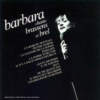 |
|
1961 |
Barbara
chante Brel |
|
1964 |
In July, she performs at
"Junges Theater" at Göttingen; Germany, for 3 evenings. On the last
day, she composes the song "Göttingen."
In September, the album" Barbara chante Barbara" appears.
In October and November, she performs in the introduction program of
George Brassens at Bobino. This brings her the gain acceptance.
|
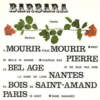 |
|
1965 |
Liliane Benelli, who had
accompanied her at the piano in the l'Ecluse, dies at an traffic
accident. Barbara dedicates "Une petite cantate" to her.
On September 15, she opens with her first own solo-concert at Bobino.
This "Septembre" will be quoted later often in chansons and live
concerts (like "Ma plus belle histoire d'amopur".)
|
 |
|
1966 |
In December, she sings
for the first time "Ma plus belle histoire d'amour" live at Bobino.
The album with the same title appears in November 1967.
|
|
|
1967 |
Tours trough Belgium, France, Canada and
Germany with Serge Reggiani.
In May, she is recording the album "Barbara singt Barbara - for the first
time in german language" in Hamburg. This will be the first and only time,
she is recording in an other language.
Another solo concert in Göttingen, now with Roland Romanelli, who is from
now on her akkordeonist.
In November, her mother dies.
In December, there is a common project with choreographer Maurice Béjart.
|
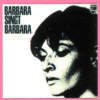
 |
|
1968 |
The album "Le Soleil Noir" recorded in June,
published in September.
|
 |
|
1969 |
In February concerts at the Olympia, where she
is every evening accompanied by George Moustaki to sing "La dame brune". On
the evening of the last perfomance on February 17, she announces unexpected
to retreat from the stage.
|
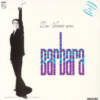 |
|
1970 |
In February, she plays in the piece "Madame",
which gets bad critics and is a flop.
In May, the album "L'aigle noir" appears. A musical change is to recognize:
the company now takes on also electric guitars and synthesizers under the
management of Roland Romanelli.
|

 |
|
1971 |
Jacques Brel gives his
debut as movie-director with the film" Franz" and Barbara in a leading
role.
|
|
|
1972 |
The album "La Fleur
d'Amour" recorded in September 1971appears in March.
Already in August, she is recording again, now "Amours Incestueuses"
which is published in November.
|

 |
|
1973 |
Barbara moves to
Précy-Sur-Marne.
She goes to Switzerland, Israel, Canada, Japan, Netherlands on a world
tour to Moscow, Belgium, and back to France. In December, she returns
to the "l'Ecluse" once again, which is finally closed.
|
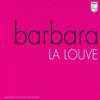 |
|
1974 |
She performs at Théâtre des Variétés. She
insists, that the most inexpensive tickets may not cost more than 15
francs. Five years after her triumph at the Olympia, now she says, she
realy never has retreated from the stage, she would have needed the
distance merely to find the desire again.
In June, she takes an overdose of sleeping drugs, is found in time and
brought to the hospital. The Chanson" Les insomnies" is created from
this experience.
|
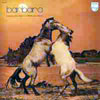 |
|
1975 |
She sings from end of January to
beginning of March at the Bobino - here "Les insomnies" for the first
time in public. Afterwards, she on tour goes to Japan through the
Netherlands, Canada and back to France.
|
|
1976 |
She plays in the (ballet -) movie "Je
suis né à Venise" by Maurice Béjart.
|
|
1977 |
In March, there is a fire in her house.
It seems to be a miracle, but the fire stops in front og her music
room, the instruments remain spared.
|
|
1978 |
In February she appears
at the Olympia.
In July, Jacques Brel returns to Paris, but to the hospital. Barbara
visits him often . Jacques Brel dies on October 9.
|
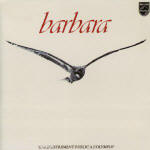 |
|
1981 |
In February, the album
"Seule" appears. She writes "Regarde" to celebrate Francois Mitterands
victory of the presidency elections.
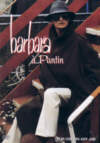 She
fulfills herself a childhood dream to appear in the circus tent in the
Parisian suburb Pantin. She performs there from October to November.
Only in the last evening, November 21, she sings the chanson" Pantin."
Already in December, the Double-LP appears. She
fulfills herself a childhood dream to appear in the circus tent in the
Parisian suburb Pantin. She performs there from October to November.
Only in the last evening, November 21, she sings the chanson" Pantin."
Already in December, the Double-LP appears.
|

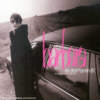 |
|
1982 |
On December 22, she
receives the Grand Prix national de la Chanson by minister of culture,
Jack Lang.
|
|
|
1986 |
From January 21 to February 19, she performs at "Zénith" with Gérard
Depardieu in the piece "Lily Passion", on which she had worked already
since 1982. Afterwards, they go on tour to all of France.
On July 8, she performs on invitation of Mikhail Baryshnikov at the
Metropolitan Opera in New York. She sings, he improvises a
choreography to "Pierre", "Une petite cantate" and" Le mal de vivre".
She begins with her personal commitment in the fight against AIDS.
|
 |
|
1987 |
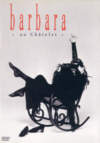 From
September 16 to October 11, she performs at Théâtre du Châtelet. She
wrote "Si d'amour at mort" and transfers all rights and profits for
this chanson to ACT UP (Aids Coalition To Unleash power). To that
time, there have been many ACT UP-Groups worlwide. Here in Germany it
was not easy to receive money for activities. Therefore, it is
especially to mention, that Barbara did this as an artist to set a
sign to the public. From
September 16 to October 11, she performs at Théâtre du Châtelet. She
wrote "Si d'amour at mort" and transfers all rights and profits for
this chanson to ACT UP (Aids Coalition To Unleash power). To that
time, there have been many ACT UP-Groups worlwide. Here in Germany it
was not easy to receive money for activities. Therefore, it is
especially to mention, that Barbara did this as an artist to set a
sign to the public.
Afterwards Barbara goes on tour through France with this concert.
|
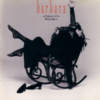
 |
|
1988 |
The tour goes on through
Japan, Canada and back to France.
On September 15, she receives the medal of honour "Chevalier de la
Légion d’Honneur" by President Mitterand.
In the same year she also receives the medal of honour from the german
city Göttingen.
On December 1st, the annual world Aids day, she announces that she
will work for one year in the fight against AIDS. She visits sick
persons in hospitals and sings in prisons.
|
|
|
1990 |
From February 6 to April 14, she gives concerts at the Théâtre
Mogador. The Live-recording appears under the title" Gauguin" on
Double-CD in May. Afterwards, she tours through Switzerland, France,
Belgium, and in autumn again to Japan.
|
 |
|
1992 |
On
the conception of the 13 CD-box "Ma
plus belle histoire d'Amour... c'est vous"
Barbara was participating watchful.
|
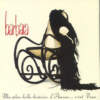 |
|
1993 |
The concerts announced for February must
be cancelled because of healths problems. Now there is new contract
for performing from November 6 to December 31 at Théâtre du Châtelet.
Already in the beginning of December some concerts are cancelled
because of Barbara's health constitution. The live receptions for the
Double-CD (published in February 1994) are taken December 11 to 13.
December realized. Then, the row is canceled. On December 14, Barbara
is in hospital with a mutual pneumonia.
|
 |
|
1994 |
Despite dissuasion of
her doctors, she goes on tour again end of January. In February, she
gives a concert at Montpellier and receives the "Victoire", the prize
for the best interpreter of the year. This prize is very important in
France, comparable to the American" Grammy"-Award.
On Saturday, March 26, she gives her last public concert at Théâtre
Vinci at Tours.
|
|
|
1995 |
Barbara tries to get some rest. But she
wants also to take care of people with Aids. She lets install an extra
telephone connection, where patients can talk to her. At this time,
she also discovers her passion for the fax-machine (we will understand
this later with her chanson on the last studio-album).
|
|
|
1996 |
In January she is
planning a new studio album. She writes and rehearses with her
musicians at her home in Précy. The last album titled just "Barbara"
appears in November. For the chanson "Le couloir" she transfers the
rights and profits to ACT UP again.
In December she begins writing her memoirs.
|
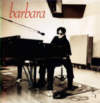 |
|
1997 |
When George Moustaki sends her a new text of a chanson and the wish to
sing it together with her, she answers, that she will not sing again.
[in 2003 Moustaki recorded the song "Odéon" dedicated to Barbara]
In February she gets the information to receive again the "Victoire"
as award for the best interpreter of the year. She expresses her
thanks by telephone.
She is now writing her memoirs, which will later appear - unfinished -
with the title" Il était un piano noir...".
She still supports social and caritative instituions.
On November 12, the Double-CD "Femme piano" with digitally remastered
versions is published, on which conception she is decisively involved.
On Monday, November 24, at 3 o'clock in the morning she is brought into the hospital of Meaux by the rescue
service and later transferred to the
American hospital of Neuilly, where she passes away at 16:10h.
Her death is made public not before the following morning.
On Thursday, November 27, Barbara is buried on the cemetary of
Bagneux beside her mother, in the grave of the family
Brodsky.
|

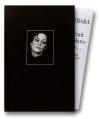 |





























